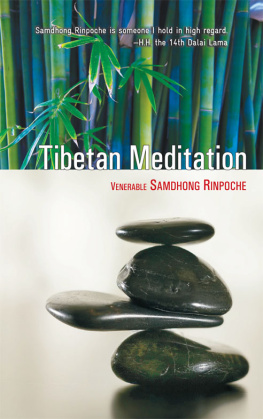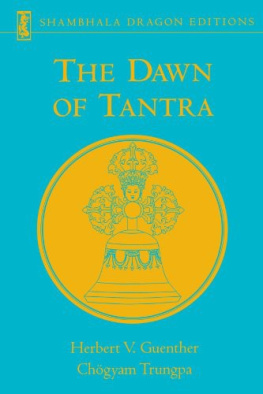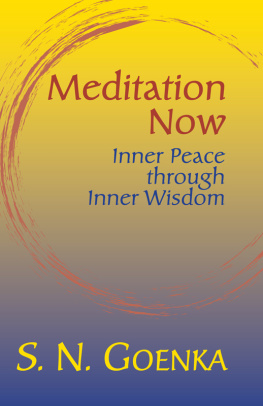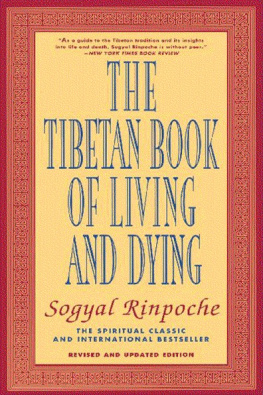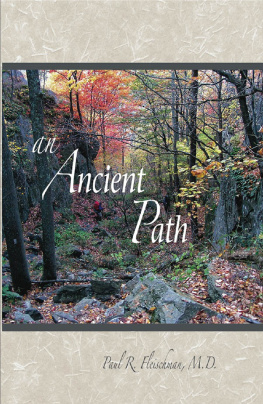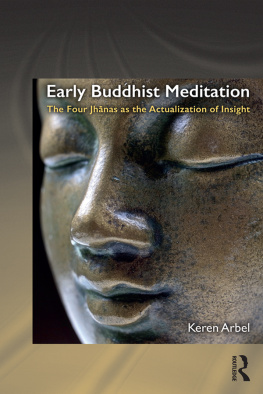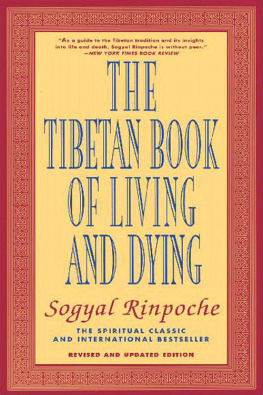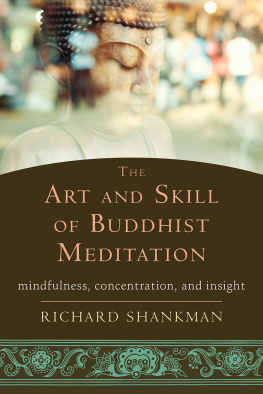The Theosophical Publishing House, Adyar, Chennai-600020, India.
www.ts-adyar.org, www.adyarbooks.com
The book has also been published with a different title Buddhist Meditation for South Asia.
First published 2011
All rights reserved. No part of this book may be reproduced, stored in a retrieval system or transmitted in any form or by any meanselectronic, mechanical, photocopying, recording or otherwisewithout the prior permission of the author and the publisher.
ISBN 978-81-8328-196-6
Published by
Wisdom Tree,
4779/23, Ansari Road,
Darya Ganj, New Delhi-2
Ph.: 23247966/67/68
Printed in India at Print Perfect
EDITORS NOTE
S amdhong Rinpoche is the head of the Central Institute of Higher Tibetan Studies at Varanasi. From infancy, he was given the rigorous religious and philosophical training suitable for an incarnated lama in Tibet. He came to India in the retinue of His Holiness the Dalai Lama in 1959 when the Chinese occupied his country.
This little book is based on a series of talks given to students at the School of the Wisdom at Adyar in 1982. It soon became evident to those who heard them that the speaker was sharing his own deep experiences of meditation without in any way wishing to impose his own preferences and views on others. There was an atmosphere of simplicity, and indeed of contemplation, that did more, perhaps, to convey the spirit of meditation than the words alone could accomplish.
Editing of the material has been kept to a minimum in the hope that readers will catch something of the same atmosphere and be inspired to go deeper into this important subject.
We wish to express our special thanks to Miss Carin Citroen for her patience and care in transcribing and typing the talks.
Editor
MEDITATION: ITS PURPOSE, MEANING AND PREPARATIONS
I am not an expert on Buddhist meditation. If one does not himself know how to sing, how can he teach another? However, let us attempt to come to some understanding of the subject. Let us begin by considering two basic questions: What is meditation? Why do we meditate? A sensible man takes on an assignment only after proper consideration of the means and the likely outcome. To start something without this does not seem to be wise.
It is true that people are intelligent enough without meditation. Science has developed beyond our expectations without meditation; the computer operates much more rapidly without meditation than the human brain that built it. Why then should we concern ourselves with it? Our innumerable births have already heavily conditioned our minds; surely they do not need further conditioning even through meditation! Why are so many people nowadays eager to meditate? In some places it is more difficult to find a good teashop than a centre for meditationor at any rate, a centre where it is taught!
And what is the result of meditation? People have meditated for years and yet they seem to be as human and miserable as those who have not. It is not my purpose to discourage you from meditation, but I mention this in order to draw your attention to this fact so that you may think about it yourself. For if you find meditation a useless exercise, it is better to do something else.
My first question to those who want to meditate would be: Why do you want to do it? I consider this question very important, for it is the intention which decides the entire value of the meditation. If our motivation is not as pure as it should be, it is our duty to correct ourselves by right thinking. Some people want to meditate because they have a disturbed mind and they want a peaceful one. They do not know what a peaceful mind is or the real nature of peace. They want a kind of peace which is restful and can produce the same effect as deep sleep; this has no connection with wisdom. They only want to be free from their restlessness, or their tiredness, or their frustration. It would be better for them to take a couple of sleeping pills for these not only work faster but produce the desired result without any effort on the part of the sufferer. Other people think of meditation as a kind of therapy for curing physical and mental diseases and although this may happen occasionally it is not its primary function. Modern medicine with its chemical remedies and techniques has far greater efficacy in this field.
Then there are those who want to gain magical powers or some sort of special powers that feed their already enlarged egos. They want something uncommon that ordinary people do not havejust to show off, in fact. For these people meditation will be an utter failure; it may even divert them into immoral activities.
We should be very careful, then, and examine our motives as to why we want to meditate. And first we must know what meditation is. For our two questionswhy do we meditate? What is meditation?are closely interrelated.
I do not know the derivation of the English word meditation, but in Sanskritic tradition meditation has two aspects, dhran and bhvan. Dhran means to concentrate and bhvan to ponder, think upon, investigate, analyse. So real meditation must consist of these two partsone- pointedness of mind and the power of analysing. These two together form the totality of meditation that is amatha and vipassan. amatha is to concentrate and vipassan to analyse. Analysis with total concentration makes meditation. Now, what do we concentrate on and what do we analyse? Generally, in the outer world one does not need a concentrated mind, a fullness of mind, in order to analyse.
Even the scientist, without meditating, and depending only on outer instruments, has analysed the material world with great skill. But he has left untouched the inner self. The truth of the inner side of things cannot be explored by scientific methods or equipment. The existence and the importance of the spiritual dimension are gaining more acknowledgements in the present day. Earlier, when science was developing, most people thought that spiritual things and the inner wisdom were irrelevant. But now scientists themselves are realising that there is still something to be discovered, and that perhaps, it can only be done by some method which is beyond materialism. Meditation is concentration and reflection and these must be inward, not outward. Meditation is the instrument that we need in order to go inside ourselves to search for that which is yet beyond ourselves.
Methods of meditation are to be found in most religious writings. The Buddhists have no special methods which could be described as purely Buddhist. But they have several insights that are specifically their own; for instance on the nature of amatha or calmness of mind, and vipassan or alertness of mind. But the techniques are derived from those known in the Smkhya, Vednta and other Hindu schools of philosophy, and perhaps in other religions which teach meditation.
Our mind, as it is, is really not qualified or equipped to search into the innermost depths of ourselves. We have been given guidelines as to how to search for things outside ourselves but hardly any directions have been given on how to look inwards. We have to train ourselves to look inside, and the only way to achieve this is through meditation. In order to meditate, the mind should be channelled, otherwise it will not have the power to concentrate on one object. In that case, what we often imagine to be meditation is not meditation at all. Our undisciplined mind is like a candle flame which flickers in the wind. Objects distorted by such a light seem to be vibrating and cannot be clearly distinguished by the eyes. Even a few moments of meditation make one realise how quickly the mind moves from one object to another and how disturbed it is by many causes such as emotions and memories. The mind resembles a crowded street in which cars, motorcycles, bicycles and people are moving. When we are in the crowd we are aware only of the rush and fuss around us, but if we look down from the top floor of a tall building we shall see how large the crowd is and how numerous the people. Similarly, when the mind is full of disturbance and obstructions we do not notice how fickle it is. When we start to meditate and are able to detach ourselves, we become aware how crowded and restless the mind is. The mind of the ordinary man is usually fragmented and divided, full of thoughts and illusions. In this condition concentration is absolutely impossible. Thus, in order to look inwards, so that we come to know our inner selves better, the mind must be trained in concentration.

